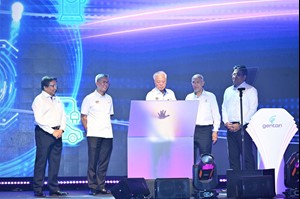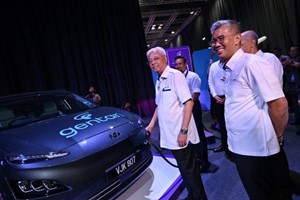News
Petronas launches Gentari to drive the energy transition through cleaner energy solutions
Clean energy solutions provider Gentari was officially launched by Malaysian Prime Minister Dato’ Sri Ismail Sabri Yaakob following a brand introduction in June. The entity, wholly owned by Petronas, aims to become a one-stop integrated clean energy solutions provider, beginning with a suite of renewable energy, H2 and green mobility solutions for commercial, industrial, and retail customers.
Leading up to its official launch, Gentari has already embarked upon a series of initiatives and collaborations in its mission to rank amongst the world’s leading clean energy companies. Gentari aims to differentiate itself from the competition through an integrated model, which seeks to fulfil multiple aspects of each customer’s needs through a portfolio of net zero solutions that cut across the electron value chain, by partnering them to remove hurdles in the journey towards net zero.
While it will secure support from Petronas during its growth phase, Gentari will operate as an independently managed entity and will seek financing opportunities to accelerate its growth in order to both meet existing demands and explore emerging energy technologies.
Chairman of Gentari, Datuk Tengku Muhammad Taufik said, “Since our announcement earlier this year, Gentari has been making steady progress in its efforts to supply lower carbon energy and help its customers both in Malaysia and beyond to reduce their carbon emissions. This was delivered by providing affordable and accessible solutions and systems, enabled by scale of production and infrastructure. As we work towards realizing Gentari’s aspirations, we also hope to significantly contribute towards national renewable energy goals by helping our local customers transition to cleaner energy sources.”
The Twelfth Malaysia Plan 2021-2025 targets for 31% of Malaysia's total installed energy capacity to be renewable by 2025, while the Malaysia Renewable Energy Roadmap targets to achieve 40% renewable energy by 2035.
Gentari's suite of renewable energy, H2 and green mobility solutions will be spread across a mix of local, regional and international projects, addressing customer demand and opportunities on the ground.
In renewable energy, Gentari will build an overall energy capacity of 30GW -40 GW in key markets by 2030, through utility-scale projects across solar, onshore and offshore wind, and battery storage, targeting commercial, industrial, and retail customers. To date, Gentari already has 1.1 GWp of renewable energy capacity in operations and under development globally. Gentari is also playing a critical role in Petronas’ decarbonization efforts groupwide, which include Malaysia’s largest single solar rooftop installation (7.4 MWp) recently at Universiti Teknologi Petronas, and solar rooftop installations currently underway at some 60 Petronas stations.
For H2, Gentari targets to offer cost-competitive low carbon H2 solutions via a comprehensive global supply network for both export and domestic demand, with an aspiration to produce up to 1.2 MMtpy of clean H2 by 2030. This segment will target industrial, power and transportation customers, particularly the early adopters. To date, Gentari has already signed 12 MoU with international partners for project development in Malaysia, India and the Middle East as well as customers in East Asia, covering initiatives to explore the development of green H2 projects and its transportation, advocacy on policy and regulations to support the H2 industry, and studies on a low-carbon ammonia supply chain, amongst others.
Gentari’s green mobility commitments include supporting the EV ecosystem by capturing 10% market share. To deliver this, it is estimated Gentari will need to pursue the delivery of 25,000 public charging points across key markets in Asia Pacific by 2030, with a mid-term target of up to 9,000 public charging points by 2026, anchoring its presence in Malaysia and India. It is also offering Vehicle-as-a-Service (VaaS) solutions starting with light-duty EV, as well as value-added services such as digital platforms, data analytics and advertising. Currently, Gentari has already installed more than 190 charging points, and delivered a mix of over 250 electric two-wheelers and three-wheelers as part of its green mobility fleet in India and Malaysia. Through the VaaS offering in India, Gentari has achieved 1,000,000 clean kilometers, equivalent to 83.4 tons of CO2 emissions reduction.
In supporting Petronas’ groupwide decarbonization efforts through an integrated model, Gentari has recently signed a memorandum of understanding with Petronas Refinery and Petrochemical Corporation Sdn Bhd to collaborate on introducing a zero-emissions vehicle fleet supported by EV charging points and exploring the potential for H2 fuel cell vehicles at the Pengerang Integrated Complex, one of the biggest integrated petrochemical facilities in the region. A 4 MWp rooftop solar installation has already been completed, while the commissioning of a 40 MWp ground-mounted solar installation is currently underway in Pengerang.



